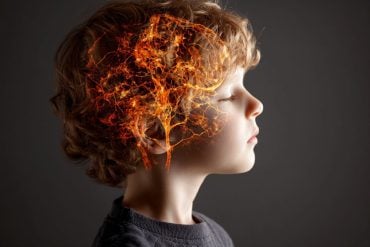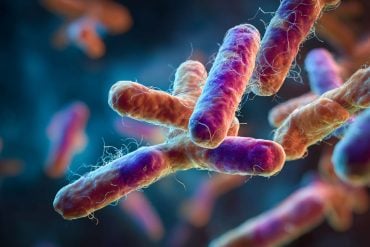Summary: According to researchers, the severity of mental health problems such as depression, anxiety and PTSD in childhood survivors of abuse may depend upon the time the abuse first took place, how long it lasted and the severity of the abuse. Sexual abuse of females also has a more detrimental effect on mental health than in males, the study reports.
Source: University of Alabama at Birmingham.
Children who are physically or sexually abused are at greater risk for developing mental health problems later in life, but the severity of these problems may depend on the time that abuse first began, how long it lasted and the severity of abuse, according to a new study from the University of Alabama at Birmingham. The study, published in Child Abuse and Neglect, suggests that abuse occurring in children age 5 or older may have the most harmful impact on mental health.
“Our study provides valuable insight into the unique mental health effects of the various dimensions of abuse, including when it began, how long it happened and how severe the abuse was,” said Jonathan Adams, a graduate research assistant in the UAB Department of Psychology and lead author on the study. “Identifying the effects of abuse could help parents and professionals know how to deal with the ramifications and look for signs of mental health problems as the child ages.”
Researchers from the UAB College of Arts and Sciences interviewed adolescents and emerging adults who self-reported the onset, duration and severity of physical and sexual abuse alongside symptoms of depression, anxiety and post-traumatic stress disorder.

The study indicated that children ages 6 to 12 who are physically or sexually abused are more likely to develop symptoms of depression, anxiety and PTSD. Children age 13 or older who are sexually abused are also more likely to experience symptoms of depression, anxiety and PTSD later in life, and those physically abused at this age were more likely to experience PTSD symptoms. Females who experienced sexual abuse suffered more detrimental effects than males.
“In the future, we need to look at other types of childhood adversities and evaluate a broader set of abuse characteristics to further determine the effects of abuse on mental health,” said Sylvie Mrug, Ph.D., chair of the UAB Department of Psychology and senior author on the study. “We also need to develop better strategies to protect children and adolescents from physical and sexual abuse.”
Source: Alicia Rohan – University of Alabama at Birmingham
Publisher: Organized by NeuroscienceNews.com.
Image Source: NeuroscienceNews.com image is in the public domain.
Original Research: Abstract for “Characteristics of child physical and sexual abuse as predictors of psychopathology” by Jonathan Adams, Sylvie Mrug, and David C. Knight in Child Abuse and Neglect. Published October 8 2018.
doi:10.1016/j.chiabu.2018.09.019
[cbtabs][cbtab title=”MLA”]University of Alabama at Birmingham”Why Some Childhood Abuse Victims are More Prone to Developing Certain Mental Illnesses.” NeuroscienceNews. NeuroscienceNews, 8 October 2018.
<https://neurosciencenews.com/child-abuse-mental-health-9981/>.[/cbtab][cbtab title=”APA”]University of Alabama at Birmingham(2018, October 8). Why Some Childhood Abuse Victims are More Prone to Developing Certain Mental Illnesses. NeuroscienceNews. Retrieved October 8, 2018 from https://neurosciencenews.com/child-abuse-mental-health-9981/[/cbtab][cbtab title=”Chicago”]University of Alabama at Birmingham”Why Some Childhood Abuse Victims are More Prone to Developing Certain Mental Illnesses.” https://neurosciencenews.com/child-abuse-mental-health-9981/ (accessed October 8, 2018).[/cbtab][/cbtabs]
Abstract
Characteristics of child physical and sexual abuse as predictors of psychopathology
Childhood physical and sexual abuse victims are at increased risk for developing depression, anxiety, and post-traumatic stress disorder (PTSD) in adulthood. Prior findings suggest abuse onset, duration, and severity moderate relationships between victimization and psychopathology. However, because these abuse characteristics are highly intercorrelated, their unique, individual effects on mental health outcomes remain unclear. To address this gap, the present study examined relationships between physical and sexual abuse characteristics and mental health outcomes and whether these relationships differed by sex. A diverse community sample of late adolescents and emerging adults (N = 1270; mean age = 19.68; 51% female) self-reported the onset, duration, and severity of physical and sexual abuse, as well as their depressive, anxiety, and PTSD symptoms. Results of a multivariate regression model (simultaneously evaluating all physical and sexual abuse characteristics) indicated that physical abuse onset in middle childhood and sexual abuse onset in middle childhood or adolescence were associated with all forms of psychopathology; and physical abuse onset at any time was uniquely linked with PTSD. Duration and severity of physical or sexual abuse did not predict psychopathology after accounting for time of onset. Multigroup analyses indicated that adolescence-onset and duration of sexual abuse respectively predicted anxiety and PTSD in females but not males, whereas sexual abuse severity predicted fewer PTSD symptoms in males but not females. Overall, results suggested that abuse occurring after age 5 may have the most deleterious impact on mental health.







